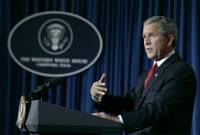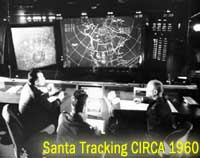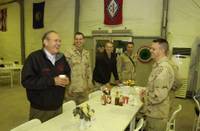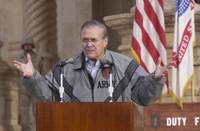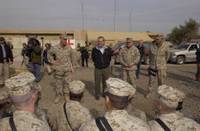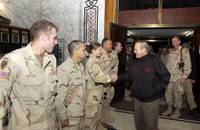For Immediate Release Office of the Press Secretary December 29, 2004
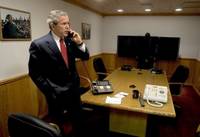
bush phone | President Discusses Support for Earthquake and Tsunami Victims
Prairie Chapel Ranch Crawford, Texas information on US Humanitarian Assistance and how you can help President Discusses Support for Earthquake and Tsunami Victims FULL STREAMING Audio |
THE PRESIDENT: Good morning. Laura and I and the American people are shocked and we are saddened by the terrible loss of life from the recent earthquake and the tsunamis in the Indian Ocean. Our prayers go out to the people who have lost so much to this series of disasters. Our hearts are also with the Americans who have lost loved ones in this tragedy. Our embassies are working with host governments to locate American citizens who are still missing and to assist those who have been injured or displaced.
This morning, I spoke with the leaders of India, Sri Lanka, Thailand and Indonesia, and expressed my condolences and our country's condolences. I told them of our support; I praised their steadfast leadership during these difficult times. We're grateful to the American and international organizations that are working courageously to save lives and to provide assistance, and I assured those leaders this is only the beginning of our help.
We are committed to helping the affected countries in the difficult weeks and months that lie ahead. We pledged an initial $35 million in relief assistance. We have deployed disaster experts to the region. All leaders expressed their appreciation for the hard work of our ambassadors and their embassy staffs to help the countries in need. As well, we're dispatching a Marine expeditionary unit, the aircraft carrier Abraham Lincoln, and the Maritime pre-position squadron from Guam to the area to help with relief efforts.
Secretary Powell is working hard. He has spoken with his counterparts in Japan, India, Australia, as well as other nations who are helping with the response in order to begin building an international coalition for immediate humanitarian relief and long-term recovery and reconstruction efforts. Based on these discussions, we've established a regional core group with India, Japan and Australia to help coordinate relief efforts. I'm confident more nations will join this core group in short order. Under Secretary of State Mark Grossman will lead a U.S. task force to work with these partners to help coordinate interagency response in our own government and to encourage other nations to participate in the relief efforts.
Let me answer some questions. Deb.
Q Mr. President, more than 50 people died yesterday, alone, in the Sunni Triangle area. And with the Sunnis backing out of the election, how concerned are you that the world and the Iraqis will view this election as credible?
THE PRESIDENT: Well, you said "with the Sunnis backing out," you mean a Sunni party has backed out? Yes. I talked to President Yawer yesterday, who happens to be a Sunni, who on the one hand expressed concern about the security situation in Mosul, and on the other hand, reminded me that most people in Iraq -- Sunni or Shia -- want to vote. And so the task at hand is to provide as much security as possible for the election officials, as well as for the people inside cities like Mosul, to encourage them to express their will.
Now, Osama bin Laden issued a statement, as you know, which made the stakes of this pretty clear to me. His vision of the world is where people don't participate in democracy. His vision of the world is where people kill innocent lives in order to affect their behavior and affect their way of living. His vision of the world is one in which there is no freedom of expression, freedom of religion, and/or freedom of conscience. And that vision stands in stark contrast to the vision of, by far, the vast majority of Iraqis and leaders like Prime Minister Allawi and President Yawer, whose vision includes the freedom of expression, the freedom of the right to vote.
And so the stakes are clear in this upcoming election. It's the difference between the ability for individuals to express themselves and the willingness of an individual to try and impose his dark vision on the world, on the people of Iraq and elsewhere. And it's very important that these elections proceed.
We just got off a conference call with our acting -- not "acting" -- Ambassador Negroponte is not in Baghdad, but Ambassador Jeffrey, his number two man, as well as General Casey, talking about how best to provide the security necessary for people to feel comfortable in voting.
Yes, ma'am.
Q Mr. President, were you offended by the suggestion that rich nations have been stingy in the aid over the tsunami? And is this a sign of another rift with the U.N.?
THE PRESIDENT: Well, I felt like the person who made that statement was very misguided and ill-informed. The -- take, for example, in the year 2004, our government provided $2.4 billion in food, in cash, in humanitarian relief to cover the disasters for last year. That's $2.4 billion. That's 40 percent of all the relief aid given in the world last year, was provided by the United States government. No, we're a very generous, kindhearted nation.
You know, the -- what you're beginning to see is a typical response from America. First of all, we provide immediate cash relief, to the tune of about $35 billion [sic]. And then there will be an assessment of the damage, so that the relief is -- the next tranche of relief will be spent wisely. That's what's happening now. I just got off the phone with the President of Sri Lanka, she asked for help to assess the damage. In other words, not only did they want immediate help, but they wanted help to assess damage so that we can better direct resources. And so our government is fully prepared to continue to provide assistance and help.
It takes money, by the way, to move an expeditionary force into the region. In other words, we're diverting assets, which is part of our overall aid package. We'll continue to provide assets. Plus, the American people will be very generous, themselves. I mean, the $2.4 billion was public money -- of course, provided by the taxpayers. But there's also a lot of individual giving in America. In this case, I think it's very important for Americans who want to give to provide cash to organizations that will be able to focus resources and assets to meet specific needs. In other words, a lot of times Americans, in their desire to help, will send blankets or clothes. That may be necessary, but to me it makes more sense to send cash to organizations that could then use that cash to make sure we match resources with specific needs on the ground. There are many NGOs now involved that understand what is specifically needed to meet the needs of these countries.
This has been a terrible disaster. I mean, it's just beyond our comprehension to think about how many lives have been lost. I know that our fellow citizens are particularly troubled to learn that many of the deaths were young children, and we grieve for their families, their moms and dads who are just, you know, heartsick during this -- during these times.
Yes, Holly.
Q Sir, Schroeder this morning said that the Paris Club nations should put a moratorium on this debt of Somalia and Indonesia. Is that something that you think the U.S. and other Paris Club nations should do, put a moratorium on these countries' debt?
THE PRESIDENT: We'll look at all requests. Right now we're assessing the short-term needs. We are -- there are two issues that are involved, obviously, in these disasters. One, what can we do immediately to help? And then, what needs to happen in the long-term to help these countries rebuild? And we're still at the stage of immediate help. But slowly but surely, the size of the problem will become known, particularly when it comes to rebuilding infrastructure and community, to help these affected parts of the world get back up on their feet.
Q Mr. President, are you confident that the U.S. west coast residents -- Hawaiian residents, Alaska residents -- are well enough protected with early warning systems for possible tsunamis affecting this country and coastal --
THE PRESIDENT: No, I appreciate that question, it's a -- I think that part of the long-term strategy in how to deal with natural disaster is to make sure we have -- "we," the world, has a proper tsunami warning system. As a matter of fact, the President of Sri Lanka also mentioned that to me. She said that one of the things that she and the Prime Minister of India discussed -- I'm not sure they discussed it, but they're both thinking the same way, let me put it to you that way -- is the development of a proper warning system. And I think it's going to be very -- I can't answer your question specifically, do we have enough of a warning system for the west coast. I am going to -- I am now asking that to our agencies and government to let us know. I mean, that's a very legitimate question. Clearly, there wasn't a proper warning system in place for that part of the world, and it seems like to me it makes sense for the world to come together to develop a warning system that will help all nations.
Q And seeing that as we have, does it concern you that we may not have that mechanism in place? Or is this something we can use through our civil defense air raid siren system?
THE PRESIDENT: I just have to look into it, that's a very legitimate question. I am on the -- I presume that we are in pretty good shape. I think our location in the world is such that we may be less vulnerable than other parts, but I am not a geologist, as you know. But I think it's a very legitimate question.
I've so far focused on the international approach towards a tsunami warning systems and it seems like to me it's a -- it makes sense for governments to come together and figure out how best to provide a warning system that will help all nations be prepared for such a disaster. Obviously, such a warning system was not in place.
Yes, Richard.
Q Mr. President, there continues to be criticism of the speed with which American troops are being armed in Iraq. Are you satisfied with the way the --
THE PRESIDENT: If the Iraqi troops are being armed?
Q No, the U.S. troops.
THE PRESIDENT: Oh, I beg your pardon.
Q Are you satisfied with the pace with which the U.S. troops are being armed in Iraq?
THE PRESIDENT: Are you talking about the armored vehicle issue, for example?
Q That and others.
THE PRESIDENT: Well, I have looked at the statistics on that, and we have stepped up the production of armored Humvees significantly. The other issue is the rearmament of existing -- of vehicles that are now in theater, vehicles that require a different armament structure than that which they initially were manufactured with. And I am told that those vehicles will be armed up by mid-summer of 2005. And what I know is, is that the Defense Department is working expeditiously with private contractors and with our military to get these vehicles armed up.
Well, listen, thank you all for coming by. I'm sorry to disrupt your day, but I felt like it was important to talk about what is going to be one of the major natural disasters in world history. And it's important for the world to know that our government is focused and will continue to respond to help those who suffer.
Thank you.
Q Any plans for New Year's Eve?
THE PRESIDENT: Early to bed.
Q New Year's resolutions?
THE PRESIDENT: I'll let you know. Already gave you a hint on one, which is my waistline. I'm trying to set an example.
Thank you all.
END 8:51 A.M. CST





